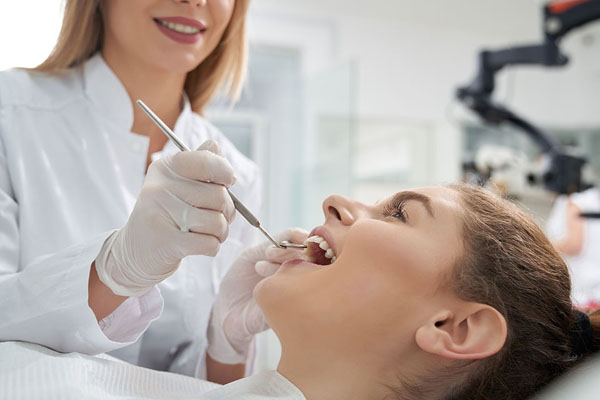Plaque and Tartar Removal
Get Your Teeth Squeaky Clean With Our Fort Wayne Dentist
Visiting your dentist twice a year is essential for keeping your smile squeaky clean and beautiful. They can clean areas of your mouth that are easily missed at home and can remove hardened tartar that’s formed and plaque buildup.
Find out how the plaque and tartar removal process works with our Fort Wayne dentist below.
What Is Plaque and Tartar Removal?
Plaque and tartar removal is performed during routine dental cleanings. Plaque is a sticky film of bacteria that forms on teeth after eating or drinking. If plaque buildup isn’t removed, it can harden into tartar, also known as calculus, which can only be removed by a dental professional. Plaque and hardened tartar buildup can lead to tooth decay, gum disease, and other oral health problems.
Only a dental professional can remove tartar from the teeth, and without removal, it can create unwanted problems.
The Benefits of Removing Plaque and Tartar
Plaque and tartar removal has numerous benefits, including:
- Prevents tooth decay and cavities
- Prevents gum disease
- Reduces bad breath
- Keeps teeth looking and feeling clean
- Maintains overall dental health
When Plaque and Tartar Removal Is Necessary
Plaque and tartar removal is necessary for anyone who wants to maintain good dental health. While most patients need dental cleanings twice a year, some may need it more than others, including:
- People who smoke or use tobacco
- People with braces or other dental appliances
- People with a history of gum disease or cavities
- People who have a dry mouth
- People with a diet high in sugar or carbohydrates
How the Plaque and Tartar Removal Process Works
Removing plaque and tartar typically takes place during routine dental cleanings. The process works as follows:
- Examination: The dentist or dental hygienist will examine your teeth to determine the extent of plaque and tartar buildup.
- Scaling: Using a special tool, the dentist or dental hygienist will remove plaque and scrape away the tartar from the surface of your teeth. This process is called scaling.
- Polishing: Once the tooth plaque and tartar are removed, the dentist or dental hygienist will polish your teeth using special toothpaste.
- Fluoride Treatment: Finally, they may apply a fluoride treatment to help protect you from future tooth decay.
The length of the cleaning procedure can vary depending on the extent of buildup on your teeth. However, it typically takes around 30 minutes to complete.
Caring for Your Teeth After Plaque and Tartar Removal
After plaque and tartar removal, it’s essential to care for your teeth properly to maintain good oral health. Here are some tips for caring for your teeth after the procedure:
- Brush your teeth twice a day with fluoride toothpaste.
- Floss daily to remove any remaining plaque and food particles.
- Use mouthwash to kill bacteria and freshen your breath.
- Avoid smoking or using tobacco products.
- Limit your intake of sugary or starchy foods and drinks.
How To Prevent Plaque and Tartar Buildup
Here are some effective tips for preventing plaque and tartar buildup on your teeth:
- Brush thoroughly twice a day: Brushing removes plaque before it can harden into tartar. Use proper technique and brush all surfaces.
- Floss daily: Flossing removes plaque and food from between teeth and under the gumline where plaque likes to accumulate.
- Use an antiseptic mouthwash: Mouthwash helps kill bacteria that cause plaque. Swish for 30 to 60 seconds.
- Eat a tartar-fighting diet: Foods high in fiber, calcium, and phosphorus help prevent tartar. Limit sugary and starchy foods.
- Drink water: Staying hydrated produces saliva which naturally washes away plaque acids and loosens plaque.
- Chew sugar-free gum: Chewing gum increases saliva flow to wash away plaque. Look for gum with xylitol.
- Get regular dental cleanings: Professional cleanings every 6 months remove hardened tartar you can’t on your own.
- Don’t smoke: Smoking makes plaque stickier and stain teeth. Quitting is the healthiest choice.
- Use fluoride products: Fluoride strengthens enamel to resist plaque acids. Use fluoride toothpaste and mouthwash.
Following good oral hygiene habits each day prevents plaque from turning into calculus. See your dentist right away if you notice tartar buildup.
Frequently Asked Questions
Is plaque removal painful?
No, plaque removal is typically painless. However, some people may experience mild discomfort or sensitivity during the procedure. This is because the dental professional is scraping away plaque and tartar from your teeth, which can cause some sensitivity or discomfort. Should you experience severe pain during the dental cleaning procedure, let your dentist know immediately.
Can I remove plaque and tartar at home?
While brushing and flossing can help prevent plaque and tartar buildup, it’s not possible to remove tartar at home. Tartar is a hardened form of plaque that can only be removed by a dental professional using specialized tools. However, you can prevent tartar buildup by brushing twice a day, flossing daily, and following a healthy diet.
Can plaque and tartar lead to other health problems?
Yes, there’s evidence to suggest that poor oral health, including plaque and tartar buildup, can contribute to other health problems such as cardiovascular disease and diabetes. The bacteria in dental plaque can enter the bloodstream and cause inflammation, which can lead to these and other health problems. That’s why it’s essential to maintain good oral hygiene and have regular dental checkups.
What should I expect after the plaque and tartar removal procedure?
You may experience some sensitivity or soreness in your gums for a day or two following the procedure. It’s also common to experience some bleeding when brushing or flossing. However, if the bleeding persists or you experience any severe pain or swelling, you should contact your dentist.
Our Fort Wayne Dentist Can Keep Your Smile Clean and Healthy
Removing built-up plaque and hardened tartar is an essential part of maintaining good oral health. By having your teeth cleaned regularly and following proper dental care habits, you can prevent plaque buildup, fight cavities, and prevent gum disease.
Remember to visit your local dentist at least twice a year and follow their recommendations for maintaining good oral health.


